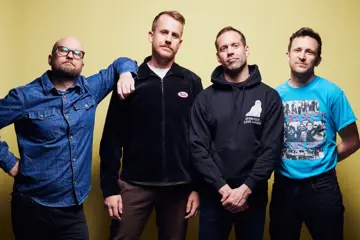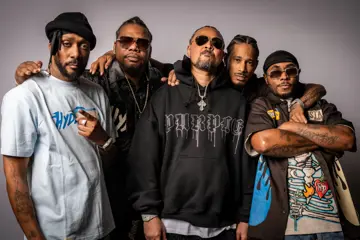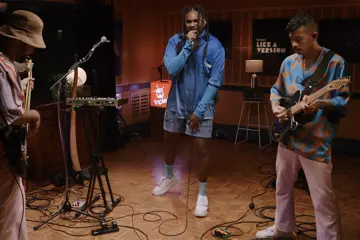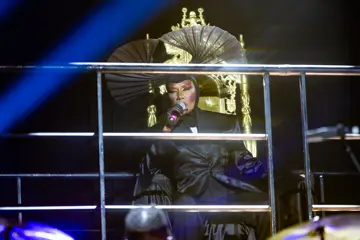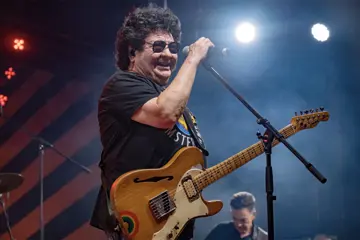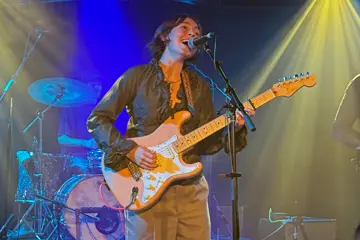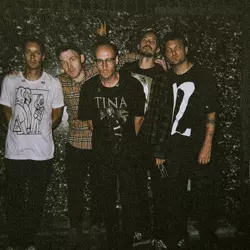 Cold War Kids
Cold War Kids"We are not trained musicians and I think that we really put our bodies into our playing,” says bassist Matt Maust. “I know that some people have not become fans of us until they see us live, and there have been some people that have told me, 'We weren't really fans of your record but we were really fans of your live show', which is really funny. I think that we're definitely fun to watch.” Cold War Kids gigs, he says, are “Pretty sweaty, pretty all over the place. It's always a new thing. I've never seen us play so I don't know but we put our bodies into it and we're not very stationary.”
Because of their faith in their live performance, the Long Beach, California band are always aiming to capture that spontaneity when they record. After five EPs and four studio albums, “We're getting better at making our records sound like we do live,” says Maust. The process involves recording a lot of their jam sessions, “For lack of a better word, and trying to capture a lot of spontaneity of the moment, then listening back then honing in on different things and then slaving over the songs after you've listened to the jams. So it's a mixture of spontaneous stuff but then paining over it and writing it.”
Their latest record Dear Miss Lonelyhearts came about through the same process, but in a lot of ways the band's approach to this record was a totally different proposition.
“The last few records we've made more in the studio and then you learn to put a song in after the fact. And the first two records were kind of the opposite, where we wrote them outside the studio and just recorded them and didn't really tinker with the songs too much.”
This was the first record they recorded in their home studio, in San Pedro, California, and their first recorded themselves with no outside engineer or producer. Guitarist Dann Gallucci, who has played in Murder City Devils and Modest Mouse, joined the band at the brewing stage of this new album, replacing Jonnie Russell and bringing with him production skills that he shared with the band's mate Lars Stalfors on the new record.
Don't miss a beat with our FREE daily newsletter
“It's the first record we'd ever made in our home space, and the first album we'd ever made by ourselves with no outside engineer or producer, so it felt really good.” Maust found there to be a lot less pressure with this record. “I prefer working this way by far. Not that the other records [were] a drag or anything, but working at home this way, not feeling like the clock is ticking, where we've always felt before, we didn't have that this time and we worked at our own pace. We put time limits on ourselves and restraints, but you don't really feel it when you're at home. You don't feel bad showing up half an hour late or anything because we're not paying for the studio in the same way that we were before.”
The record was also the first one they'd ever recorded completely digitally. Vocalist and guitarist Nathan Willett has said of this album that the band tried to care more about the songs and less about how they got there, and Maust wonders if that statement might have something to do with the recording process. “I'm not sure what he means by that. I don't think we've ever been purists with like, having to record to tape and all that stuff, but it is the first record we've made that never touched tape, it's all digital. He might be meaning something like that. It's the songs that are important and not so much the process.”
Maust is also an accomplished visual artist, and he draws parallels between his visual art process and that of the band's musical process. When he says “There's a healthy amount of spontaneity and rambunctiousness but then also a good amount of editing and deleting things that don't need to be there,” he could be talking about either his art or his music. Maust is a trained designer with a penchant for a punk Xerox look, and he created the majority of the Dear Miss Lonelyhearts' packaging, which consists of “Lots and lots of drawings. Most of the drawings I've done while touring, just on sketch pads, in hotel rooms or on planes or whatever. And I travel with them in my suitcase and I get home and I scan them and I rework them and do things. So the majority of the new record is all kind of done on tour but then kind of in a similar way to the way we write our songs, you know, we take spontaneous moments, in a quick drawing, sketch kind of way, but then we spend a lot of time on the output and the rendering and the shaping it. I like to work half analogue and half digital in terms of artwork. I like to blur the lines.”
Cold War Kids have developed a literary reputation that is mainly due to lead singer Nathan Willett's lyric writing being inspired by literary works, themes and theory. The band's second album was called Loyalty To Loyalty, named after a paper written by the philosopher Josiah Royce, a reaction to Nietzsche's philosophy of 'rising above'. Willett has also often professed his love for heavy writers like Tolstoy and David Foster Wallace.
Further adding to their reputation as a literary band, Cold War Kids have named their most recent album after a Nathanael West novel about an LA advice columnist that Maust admits he hasn't read yet. “Nate read it a year or so ago and it had a big effect on him. There's a lot of things in that book that influenced the record. I need to read it. Nate has talked about it a couple of times and the way that book is written I think is very much in the Cold War Kids spirit of characters. I think that book has got a lot of characters and I think that our songs have many, many characters. Lyrically that's not my place to answer, Nate writes all the lyrics, he goes off by himself and writes them all...”
The band is in the throes of rehearsing for their upcoming tour, which will encompass Australia for “maybe the fifth or sixth time.” When they first toured Australia at the start of their career they were playing larger capacity venues than they were at home in LA, and Maust concludes by simply saying, “We have the best shows in Australia, we've never had a bad one.”



